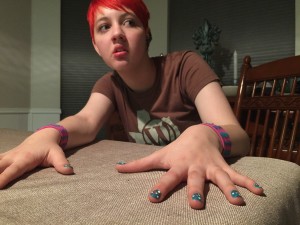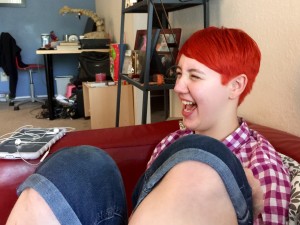Might Have Been
 There are tricky topics for discussion among special needs parents, some of them rightly so. We don’t love to talk about the state of our relationships, for example, because it’s not like we can change the things that make our lives as parents so complicated, so why even bring it up? And we don’t like to talk about things like magical oils or weird cure-alls (“Your child’s brain functions will return to absolute normal with this all-bug diet!”) because that stuff makes us all crazy enough at the dinner table at Thanksgiving when distant relatives start bringing up this thing they saw on the internet and why not just try it? We don’t need to bring that negativity into the tournament.
There are tricky topics for discussion among special needs parents, some of them rightly so. We don’t love to talk about the state of our relationships, for example, because it’s not like we can change the things that make our lives as parents so complicated, so why even bring it up? And we don’t like to talk about things like magical oils or weird cure-alls (“Your child’s brain functions will return to absolute normal with this all-bug diet!”) because that stuff makes us all crazy enough at the dinner table at Thanksgiving when distant relatives start bringing up this thing they saw on the internet and why not just try it? We don’t need to bring that negativity into the tournament.
There’s one topic that feels especially fraught with peril, and yet it’s one that I guess we all think about from time to time. It brings guilt and shame, not just because we’re having the thoughts themselves, but also because of the ridiculous yet persistent guilt that most of us have tangled with all along. It’s also the disquieting sense that we are responsible for our child’s disability, even if just through our complex soup of genetic makeup.
The topic we shy away from and yet are held captive is simply what our child might be like without their disability.
God, I know. You don’t have to tell me, because I know.
As parents, there’s a process, one that begins early on. No one really wants to talk about this anymore, and the term “mourning” has been deemed offensive to many, which I can understand. So I’ll simply say there’s a process of letting go of our expectations. This is an important step, because it clears the way for embracing the child you have. Our kids may not be typically developing, and they may not be able to move through this world in a typical manner, but they’re not incomplete, either. It is our absolute privilege to know them and to help guide them to a place where they can meaningfully navigate that world on their own terms. Letting go of that perfect, boring little imaginary kid is crucial. He was just going to let you down anyway.
There are times, though, when I look at Schuyler and I wonder. I think about what her voice might sound like, and the amazing things she might have to express with that sweet voice. I wonder if should would have a Texas accent (she totally would, y’all), or if her speech would be peppered with “ums” and “likes”. I wonder what kind of writer she’d be if her understanding of language and the world were more complete. Would she have found her talent already? Would she be a percussion wizard, or would she have found another musical or artistic path? Would she be driving a car now? Would she have a boyfriend or a girlfriend? Or a close and equal friend at all, for that matter?
Schuyler has a cousin who is almost her exact age, younger by two weeks. In many ways, he provides an unspoken, mostly unacknowledged benchmark by which her alternate self might be tracked. We almost never discuss it, even with each other, but with every milestone he achieves, with every academic advancement and musical accomplishment, with every typical mile marker he passes, we feel it just a little. There but for the vindictiveness of God goes she.
Might Have Been is not fair, and it’s not right. It’s downright wicked, and we push it down, like all special needs parents who feel such push it down deep. It means nothing, it helps nothing. Might Have Been is entirely destructive. There’s not a “but” here, aside from the one that says “but in our moments of weakness, we peek under that sheet anyway.”
After fifteen years, there’s something else I’ve discovered about Might Have Been, something I wish I’d known all along and something I wish I remembered all the time. Might Have Been isn’t just an asshole. It’s a fiction.
That child doesn’t exist, but there’s not a vacuum in it’s place. Schuyler is who she is, and her disability doesn’t just make thing harder for her. It changes everything about how she thinks and how she processes the world around her. Those different paths are hard for her teachers and friends and even family to understand, and impossible for us to travel. But they are her paths, and they are beautiful. We only have to have the eyes to glimpse them from time to time.
I can say a great many things about Schuyler, and I can describe the hardships she faces and is likely to face for the rest of her life. God knows I think about them almost constantly, my own boulder that I push up that hillside. But there’s one thing I can tell you with absolute certainty, and I imagine most of the people who know Schuyler would say the same thing about her.
Schuyler is, by a country mile, the happiest human being I know. And it’s not because she doesn’t know any better. It’s because she does. She gets the beautiful parts of the world, while I often only see the pain and the cruelty that it holds for her and for us all, I guess. Schuyler holds on to the aspects of the world that she cherishes, and she tries very hard to throw away the rest. I don’t know if that’s a plan for success or if it’s going to bite her face off one day. I only know that it works for her, and it gets her through days both simple and complicated.
And I know that in that regard, I envy my daughter very, very much. As I should. As should we all.
Note: To support the site we make money on some products, product categories and services that we talk about on this website through affiliate relationships with the merchants in question. We get a small commission on sales of those products.That in no way affects our opinions of those products and services.


